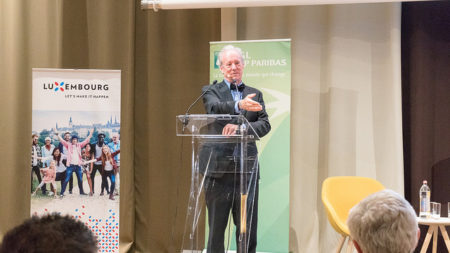Not afraid to speak his mind or the hard truths, this celebrated architect and world renowned leader in sustainable development said that Luxembourg is capable of helping the progress of circular thinking at the global level if what we are doing here can be replicated elsewhere in the world on a much larger scale.
Designer, advisor, co-author of Cradle to Cradle + The Upcycle and Time magazine “Hero for the Planet” William McDonough aims to change the design of the world. Participants at the Luxembourg Circular Economy Hotspot 2017 conference in June were inspired by William McDonough’s strong and genuine presentation on moving humanity forward via a paradigm shift in our thinking.

Continuous currency
William McDonough focuses on the concept of “continuous currency” demonstrating the value in keeping all assets in a closed loop system, a circular economy. During his talk, he shared a wealth of examples that illustrated the potential and progress toward a circular economy for Luxembourg and beyond by starting with values rather than value. As an example he spoke about how collaboration with his team in the Netherlands at William McDonough + Partners has led to the creation of Park 20|20, a new model of sustainable development that implements the Cradle to Cradle® philosophy at all scales – from the molecular to the city. The buildings in this unique office park exemplify continuous currency – its buildings are long-term assets, designed for disassembly for materials to be reused in another production or returned as raw materials in the future.
William McDonough also spoke about other extraordinary examples of circular design, from the manufacture of carpets which draws inspiration from our connection to nature and minimises the use of new materials and eliminates waste, to newly announced compostable T-Shirts by a major retailer.
Replacing bads with goods
At the conference William McDonough took questions from the crowd. One of the most interesting conversations that rose out of this was his insistence that plastics should not be recycled but rather he supports the destruction of complex plastic waste streams for a viable circular economy. – “A circular economy would not be very good if it just circulates bads over and over again,” he said. “Let’s move away from doing less bad to more good, and eliminate the concept of waste.”
All in all it was incredible food for thought that suggests that we must start thinking in a different way and applying our knowledge towards sustainable designs, product and lifestyles. “If humanity is going to thrive on the planet, we need a plan,” William McDonough concluded.
Enjoy the conversation and tweets from the Luxembourg Circular Economy Hotspot on Twitter at #LCEH17.
